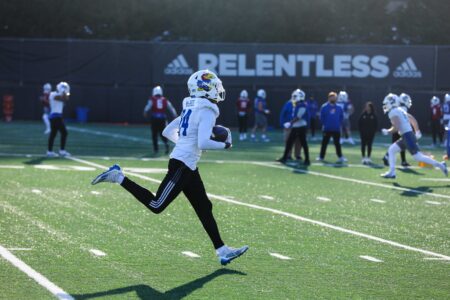Probe timing curious
The timing is one of the strangest facets of the Kansas University athletic department’s investigation into football coach Mark Mangino’s treatment of his players. Why in the world couldn’t it wait until the end of the season? Why the urgency to jump-start it with two weeks remaining in the season?
One possible explanation is that once the athletic department became aware of complaints from parents of players, past and current, the university became liable for any potential negative consequences in the event the coach repeated the complained-about behavior. If that is indeed the case, the complaints issued surely centered on behavior far more serious than a coach’s finger in a player’s chest. This theory on why the investigation couldn’t wait for the end of the season only flies if there is a smoking gun and if the complaints differed greatly in magnitude from gripes from seasons past.
What isn’t clear is what other incidents were discussed and by whom they were brought to the attention of athletic director Lew Perkins. Arist Wright, when contacted by assistant athletic director Chris Howard about an incident with Mangino, cooperated, but it’s not known what else made Perkins call a meeting with the players and what made him assign assistant AD/risk management Lori Williams to conduct an investigation.
When will The Williams Report be concluded and digested? When big money is at stake — and $6 million-plus counts, even in the Monopoly-money world of big-time college athletics — wording everything carefully becomes imperative. An investigative report one day could become a legal document the next.
If Mangino is terminated — which nearly is akin to saying, “If the sun comes up in the morning” — Kansas will do so with cause in an attempt to save the remaining $6 million-plus on his contract. Mangino then can go through the appeal process spelled out in his contract and if he loses there can try to recover his money in court.
Mangino said Tuesday that he and Perkins talked for “10 or 15 minutes.” If the fly on the wall had ears and vocal cords, maybe it would tell us that Perkins told Mangino he had the goods on him to fire him with cause and offered to negotiate a buyout, which might have saved Mangino the embarrassment of former players going public with their bitter feelings about him. Maybe the fly could have told us that Mangino, either on the spot or after talking to an attorney, decided to roll the dice and go for all the money. If that’s the case, it amounts to a legal battle between a pair of stubborn men.
Maybe Perkins and Mangino could get together face-to-face over cigars as they did when Perkins told his coach why it was a mistake to accuse the game officials of stacking the deck in the favor of Texas after a controversial call swung the outcome in favor of the Longhorns in 2004. Not likely at this point.
When trying to determine whether Mangino will coach the Missouri game, think like an attorney, not a sports fan. There are six million reasons not to rush Mangino out the door just so someone else coaches the Missouri game. The shorter the investigation takes, the more the athletic department could be open to charges that it had a pre-determined outcome.







